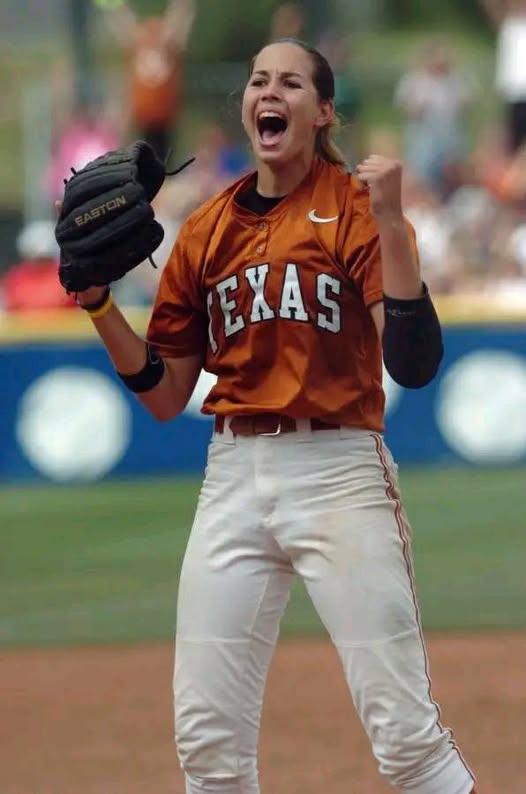In a groundbreaking announcement that sent shockwaves through the world of college athletics, ESPN has officially declared Cat Osterman the Greatest College Softball Pitcher of All Time. The report, released on Independence Day, honors the iconic University of Texas southpaw by placing her atop a legendary list that includes all-time greats like Jennie Finch, Lisa Fernandez, and Monica Abbott. This recognition isn’t just a celebration of Osterman’s statistical excellence — it’s a tribute to her profound influence on the game of softball.
For a sport that has seen no shortage of icons and dominant dynasties, Cat Osterman’s elevation to the top of the mountain marks a new era of appreciation for a player who not only shattered records but helped define an entire generation of college softball.
The Rise of a Legend: Osterman’s Dominance at Texas
Cat Osterman arrived at the University of Texas in 2002 as a tall, lanky freshman with a wicked rise ball and an insatiable appetite for competition. By the time she threw her final pitch for the Longhorns in 2006, she had become the most feared hurler in the NCAA.
Her collegiate stats are the stuff of legend:
- Career Record: 136–25
- ERA: 0.51
- Strikeouts: 2,265 (third all-time in NCAA history)
- No-Hitters: 20
- Perfect Games: 7
- Opponents’ Batting Average: .071 (lowest in NCAA history)
These numbers, as dazzling as they are, only scratch the surface of her impact. Osterman was a four-time NFCA All-American, three-time USA Softball National Collegiate Player of the Year, and the only player in NCAA history to lead the nation in ERA four times.
Despite taking the 2004 season off to pitch for Team USA in the Athens Olympics (where she helped win a gold medal), Osterman returned to college softball without missing a beat. Her senior season was arguably her most dominant, finishing with a 38–4 record and a 0.42 ERA while guiding Texas to the Women’s College World Series (WCWS) semifinals.
ESPN’s Historic Ranking: Why Osterman Now Stands Alone
According to ESPN’s panel of analysts, coaches, former players, and statisticians, Osterman’s career represents the most complete blend of dominance, longevity, innovation, and impact in the sport’s modern era.
The network cited several reasons why Osterman edged out fellow legends:
1. Unparalleled Strikeout Mastery
While Monica Abbott holds the NCAA record for career strikeouts (2,440), Osterman’s strikeout-to-inning ratio is untouchable. She averaged 14.3 strikeouts per 7 innings, the highest in NCAA history, routinely racking up double-digit Ks even against top-10 opponents.
2. Consistency Across All Four Seasons
Unlike some players who peak for a season or two, Osterman was elite every year she stepped onto the rubber. From her freshman year to her redshirt senior season, her ERA never exceeded 0.89, and she consistently maintained command over all her pitches.
3. Pitching Arsenal Ahead of Its Time
Her rise ball was already legendary by her sophomore year. But Osterman’s command of the curve, drop, and changeup made her unpredictable. ESPN’s analysis showed that opposing hitters never “figured her out” — even after multiple matchups.
4. Mental Toughness and Leadership
Osterman’s poise under pressure — whether at the WCWS or international competition — set her apart. She was a mentor to teammates and a nightmare for batters. Former opponents often speak of her uncanny ability to make elite hitters look amateurish.
Surpassing Finch, Abbott, and Fernandez: What Separates Cat?
The ESPN report ignited debates across social media and sports talk shows. Many wondered how Osterman could surpass names like Jennie Finch (Arizona), Lisa Fernandez (UCLA), and Monica Abbott (Tennessee), each of whom left indelible marks on the sport.
Jennie Finch (Arizona)
A symbol of grace, power, and winning, Finch went 32–0 in 2001 and was a national champion. She was a media sensation and a dominant force. However, ESPN cited that Finch pitched in a slightly less competitive pitching era and had fewer strikeouts per 7 innings (around 9.0).
Advantage Osterman: Longevity, strikeouts, and consistency.
Lisa Fernandez (UCLA)
Often described as the most complete softball player, Fernandez was a two-way legend, batting .382 and pitching with a 0.22 ERA. She won two WCWS titles and is an Olympian many revere as the face of 1990s softball.
Advantage Osterman: While Fernandez was more versatile, ESPN emphasized pure pitching dominance as the criteria — and there, Osterman wins.
Monica Abbott (Tennessee)
Abbott owns the NCAA records for wins (189), strikeouts (2,440), and innings pitched (1,448). Her volume stats are unmatched, but her ERA (0.79) and WHIP are slightly higher than Osterman’s. Critics also note Abbott played more games and faced weaker early schedules.
Advantage Osterman: Efficiency and ERA — quality over quantity.
Texas Forever: What Osterman Means to Longhorn Nation
In the eyes of Texas fans, Cat Osterman isn’t just a softball legend — she’s an immortal figure in UT athletics.
Darrell K Royal. Vince Young. Ricky Williams. Cat Osterman.
Those four names form a pantheon in Austin, and Osterman’s place among them was sealed long ago. The ESPN announcement only reinforced what Longhorn Nation has believed for nearly two decades.
Osterman’s impact extended beyond the diamond:
- She inspired a wave of youth softball participation across Texas and the southern U.S.
- She appeared in national commercials, promoting women’s sports at a time it desperately needed visibility.
- Her return to UT as a volunteer assistant coach and later as a commentator kept her deeply connected to the program.
Global Impact: Osterman’s Legacy Beyond the NCAA
Cat Osterman didn’t just dominate college softball — she elevated the game globally.
Olympic Greatness
As a key part of Team USA, Osterman won gold in 2004 and silver in 2008. She was also part of the 2020 Tokyo Olympic team (played in 2021), where she once again baffled international batters in her late 30s. That performance turned heads and reminded the world just how long her excellence endured.
Pro Softball Icon
In professional softball, Osterman starred in the National Pro Fastpitch (NPF) league and later in Athletes Unlimited, where she continued to break barriers, earn MVPs, and serve as a role model for young athletes.
Advocate and Educator
Off the field, she’s been a powerful voice for:
- Gender equity in sports
- Mental health for athletes
- Opportunities for girls in underserved communities
Her legacy isn’t confined to a mound. It spreads to classrooms, media booths, and policy panels.
Reactions Pour In: “She Earned Every Bit of This”
Former teammates, coaches, and rivals quickly chimed in after the ESPN report dropped.
“The best to ever do it. Her spin, her mindset, her preparation — unmatched.”
— Natasha Watley, former Team USA shortstop
“Cat changed the way we coach pitching. She made us better just by existing.”
— Mike White, current Texas softball coach
“People used to say I was the best. But if there’s someone above me, I’m glad it’s Cat.”
— Jennie Finch, in an emotional video on Instagram
Social media erupted with highlight reels, GIFs of her devastating rise ball, and a trending hashtag: #GOATsterman
What’s Next for the GOAT?
At just 42, Cat Osterman remains deeply invested in the game. She currently serves as a special advisor for Texas Athletics and runs one of the most popular pitching academies in the country. Her influence now stretches to MLB circles, where she’s worked as a guest pitching consultant.
There are whispers that Osterman might explore coaching full-time at the collegiate or even professional level. If she does, expect another era of greatness to unfold.
Final Word: A Pitcher, A Pioneer, A Powerhouse
Cat Osterman is more than her strikeouts, her ERA, or her Olympic medals. She is the living embodiment of what it means to be great in every facet — technically, competitively, and culturally.
By declaring her the Greatest College Softball Pitcher of All Time, ESPN has not only honored her career but acknowledged a movement — one that began with a teenager from Houston and grew into a nationwide standard of excellence.



